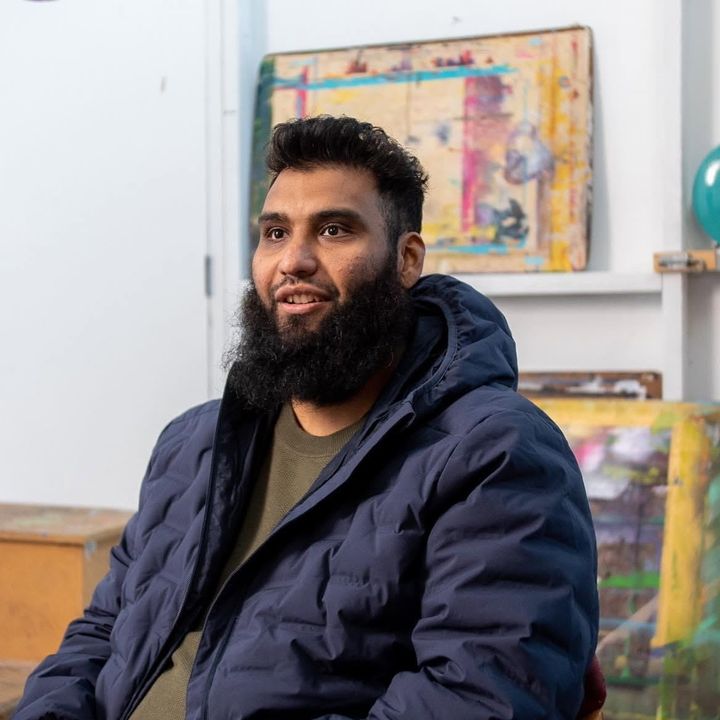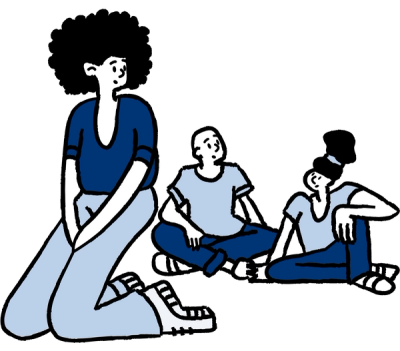In his early 20s, Annas began experiencing suicidal thoughts but didn’t know how to talk about them. Stigma around mental health in his community made it difficult to reach out, so he turned to Lifeline’s text crisis support line. That conversation became a turning point, offering him the space to express himself without fear of judgment.
Over time, Annas found support from his family, pursued therapy, and became an advocate for mental health and suicide prevention. Though he still faces challenges, he’s learned the power of connection and is here to share his journey from struggle to hope.
Listen here
Read the transcript:
Annas:
[00:00:00] It just gave me some sort of security that I was able to like talk to someone other than someone I knew.
Narrator (Lifeline):
[00:00:12] Welcome to Holding On To Hope, a series that shares the stories of everyday Australians that have experienced moments in crisis and found a path to support.
[00:00:21] Whilst all of the stories shared offer hope and inspiration, at times you may hear something you find triggering.
[00:00:27] If you or someone you know needs crisis support, please phone Lifeline on 13 11 14, text 0477 13 11 14 or visit lifeline.org.au for Lifeline chat service, which is 24/7.
Carla (Host):
[00:00:43] Hi, I'm Carla and welcome to this episode of Holding On To Hope.
[00:00:48] In his early 20s, Annas began experiencing suicidal thoughts but didn't know how to talk about them.
[00:00:54] Stigma around mental health in his community made it difficult to reach out, so he turned to Lifeline's text crisis support line.
[00:01:04] That conversation became a turning point, offering Annas the space to express himself without fear of judgment.
[00:01:11] Over time, Annas found support from his family, pursued therapy and became an advocate for mental health and suicide prevention.
[00:01:19] Though he still faces challenges, Annas has learned the power of connection and is here to share his journey from struggle to hope.
[00:01:29] Annas, it's lovely to talk with you.
Annas:
[00:01:31] Thanks for having me for this opportunity. It's definitely a privilege to be part of it.
Carla (Host):
[00:01:35] So can you take us back to when you first started experiencing suicidal thoughts?
[00:01:41] What was going on for you? What was going through your mind?
Annas:
[00:01:44] When I first experienced suicidal thoughts, I was very confused about what I was feeling.
[00:01:51] I didn't quite understand what was going on.
Carla (Host):
[00:01:55] And you were so young, right? You were only in your early 20s, is that right?
[00:01:59] Still trying to figure out who you are, what's going on?
Annas:
[00:02:03] Early 20s. Yeah, I figuring out who I was.
[00:02:06] Because I was already struggling with life as it is, with Islamophobia on the rise.
[00:02:12] I didn't feel like I was able to talk to anyone about it.
[00:02:15] Yeah, it was a very confusing and blurry time, if I want to look back and think about how I was feeling.
Carla (Host):
[00:02:23] And you mentioned you felt like you couldn't talk to anyone about it.
[00:02:26] What do you think was the concern for you there about opening up and telling others how you were feeling, what was going on?
Annas:
[00:02:33] My community didn't talk about it much, or as I didn't know what was going on.
[00:02:38] So, like, I didn't know how to word it.
[00:02:40] Like, I feel like even to this day, I struggle to word it.
[00:02:46] Like, I don't know if it's the stigma attached or what, but, like, I struggle to tell someone, hey, I'm feeling like this.
[00:02:55] Even though I feel like I've gained a great support circle, who appreciate me for who I am and who are there for me when I'm at the lowest, I still feel like I struggle to talk about it or to mention it, because you probably don't want to be, like, a burden for them.
Carla (Host):
[00:03:16] Feeling that you're going to put people out or make it uncomfortable for other people?
Annas:
[00:03:21] I think that's the way, like, yeah, make it uncomfortable for people, even though, like, I know it's fine to just say it.
[00:03:32] If people really care about you, they would understand or they'll sit by you no matter what.
[00:03:37] But I think having that stigma attached, I think that also pays a factor.
Carla (Host):
[00:03:43] Would you be able to say a little bit more about what stigma looks like for a young man in a Muslim community who's experiencing mental health struggles?
Annas:
[00:03:53] So when I reached out to my friends for the first time, they literally pushed me aside and they were just, like, saying that my faith was low, I just should pray more, and, like, pretty much man up and get over it.
[00:04:09] But the stigma is, as well, where it's not really talked about in the community.
[00:04:16] It just seems like it has that same attitude that my friends had because it's not really talked about or the local leaders and stuff are not really, like, talking about it.
[00:04:30] They just, I feel like they just don't have the resources for it or they don't know how to deal with it.
[00:04:34] I felt very isolated, and I think it's very tiring as well, where I feel like I'm the only one who's talking about it in my community.
[00:04:44] I would tell them how I'm feeling, but I can never tell them, hey, I'm feeling like I'm having suicidal thoughts.
Carla (Host):
[00:04:49] I wanted to ask you about when you reached out to Lifeline's text crisis line.
[00:04:55] Like, what made you decide to reach out?
[00:04:58] And what was that experience like for you?
Annas:
[00:05:00] I remember being in my living room, and I remembered seeing that message, so I thought, I'm going to try it out.
[00:05:08] Let me just see what this is all about.
[00:05:12] And, like, for someone who hates phone calls, I was like, I would never go on the phone to talk to someone.
[00:05:18] I just thought to try it one time.
[00:05:21] With all honesty, I thought it was a bit weird because I was, like, here waiting patiently with my legs shaking for a response.
Carla (Host):
[00:05:28] Yeah.
Annas:
[00:05:28] But then I realised, I was like, wait a second, this is another person.
[00:05:31] So maybe they're, like, it's just, like, texting someone.
[00:05:33] If I remember correctly, they were asking, oh, what do you want to talk about?
[00:05:36] So I just briefly said what I want to talk about.
[00:05:38] And then I think that's why it made me realise that my overthinking and what I was thinking and why I was feeling a certain way wasn't as big as it seemed because they didn't make it seem like that.
[00:05:53] But, like, I think reading the text back and realised what was going on, I was like, oh, it wasn't that bad.
[00:05:59] And then knowing that, I guess, they don't know who I am, they can't hear my voice, they'll probably, if I remember correctly, I think they asked my age and my gender, and that's about it, if I remember correctly.
[00:06:08] And then I think that definitely made me feel like, yeah, it wasn't that bad to tell someone about what I was feeling.
[00:06:18] When I told them, oh, thank you for hearing me out, that's all I need for now.
[00:06:24] It was very, like, straight to the point.
[00:06:26] They're like, oh, no, that's all good.
[00:06:28] If you need anything else, feel free to message again, etc.
[00:06:31] Yeah, so I think it definitely helped the ease of that phone anxiety.
[00:06:35] I was able to write what I wanted or erase what I wanted.
[00:06:38] And so, yeah, it just gave me some sort of security that where I was able to, like, talk to someone.
[00:06:46] If I needed to talk to someone other than someone I knew.
Carla (Host):
[00:06:50] It also sounds like the text gave another benefit, that you could read over what you'd written and think about how you'd expressed yourself.
Annas:
[00:07:01] Yeah.
Carla (Host):
[00:07:02] And did you use that?
[00:07:03] Did you read over things, over those text exchanges with Lifeline?
Annas:
[00:07:09] I did the next day.
[00:07:11] I just happened to, like, read over it.
[00:07:12] I think it definitely gave me that. Like, once you say something on the phone, it just disappears.
[00:07:20] Not disappears, but you can't remember what you said.
[00:07:23] Or if you're rambling and then you ramble too much, you're like, 'what did I just say?'
[00:07:26] But with text messages, I was able to, yeah, reflect on what I was going through.
[00:07:31] And I guess, like, even if they misinterpret something, then you can write back and be like, 'actually, you meant like that'.
[00:07:37] And when you read it back to yourself, when you're like, 'actually, thanks for hearing me out, I guess it wasn't that bad compared to the anxiety I was feeling about it.
Carla (Host):
[00:07:50] How did that impact your ability to reach out for help?
Annas:
[00:07:54] So I think what helped me or encouraged me to reach help was my sister.
[00:08:01] I just remember being in my bedroom on my phone and she happened to come in and she's asked if I was all right.
[00:08:09] And I said, 'yeah, I'm fine.'
[00:08:10] 'Like, it's all good.'
[00:08:11] But whatever it was that made her ask me again, I don't know, but I just burst into tears and then she goes, 'oh, what's wrong?'
[00:08:17] And then I kind of described the thoughts I was having and if it wasn't for her, who I have to ask again, I don't know where I would have been in a few years, but I think that definitely helped a lot.
[00:08:34] And she encouraged me to tell my mom, like, she's like, 'tell mum about what you're feeling, mum will be supportive and then hopefully you can get help with it.'
[00:08:42] I think it was the next day I told my Mum, I was like, 'Mum, I'm not feeling like I'm not feeling well.'
[00:08:47] 'I think we should go see the GP and go from there.'
Narrator (Lifeline):
[00:08:51] We hope you're enjoying this episode.
[00:08:54] Lifeline's new support toolkit makes it easier to care for family, friends and loved ones and look after yourself along the way.
[00:09:02] Visit us at toolkit.lifeline.org.au.
[00:09:05] Now back to the episode.
Carla (Host):
[00:09:07] And your own experience with mental health has another layer to it too.
[00:09:14] You've recently been diagnosed with ADHD and started medication.
[00:09:19] How's that shaped your mental health journey?
Annas:
[00:09:22] Finding out that I had ADHD and it kind of made sense all along because I always felt, and I remember telling my mum this, that I felt my thinking process was different or the way I see the world was different.
[00:09:39] But I didn't understand how or why, and like, even with school, I remember literally deliberately tearing up paper and crumbling up and walk to the bin and then come back like every like five minutes or imagine the clock falling on the teacher's head or not being able to do schoolwork or homework.
[00:10:01] It's definitely been a struggle on like finding what I want to do and like finding ways to, you know, like strongly focus on certain things that I want to focus on.
[00:10:14] I worry like if I want to like apply for a course or something, would I be able to sit down and actually pay attention to it?
[00:10:20] Now I know why my brain is like this, but what can I do about it?
[00:10:24] And I think that's definitely one of my, like, one of my struggles being diagnosed.
Carla (Host):
[00:10:30] I think it's important though to tell that story, your story of both the experience of suicidal thoughts and the ADHD diagnosis.
[00:10:40] Because lots of people are struggling with or living with multiple things in their lives and telling your story that it just doesn't end here, that there are other things that we're going to have to face in life and find ways through. Online friendships and gaming and making those connections,
[00:10:59] how have those connections helped you?
Annas:
[00:11:02] They've definitely been really supportive and they've been really like, like one of my number one supporters.
[00:11:08] They, I haven't like told them everything that I've experienced, but like I've told them enough to know me and it makes me feel like I can be myself with them.
[00:11:17] And like, I don't have to mask.
[00:11:19] I feel like I have to mask with certain people.
Carla (Host):
[00:11:22] Yeah.
[00:11:23] It's definitely been a journey, especially for someone who lost a lot of friends throughout the years.
[00:11:30] I never thought that once I purchased my PC that I would be able to meet some, such awesome people on this device.
[00:11:37] And it helps me definitely build my skills dealing with social anxiety and helps me a little bit be myself more without judgment and stuff.
[00:11:47] So it's definitely been a wild ride with them.
Carla (Host):
[00:11:52] And when you said you have to mask with some people, what does that mean for you?
Annas:
[00:11:56] I feel like I have to act a certain way.
[00:11:59] I have to tone it down a little, not so chaotic or like not so hyperactive, can't just like be quiet or like have like quiet moments or like dead space.
[00:12:08] Like I just have to be a certain way.
[00:12:10] Like I have to be, I think like, yeah, more extroverted. I know I'm not extroverted.
[00:12:16] I may seem like I enjoy the networking or I enjoy the socialising, but like deep inside, I'm sweating.
[00:12:23] My forehead's like sweating or I'm thinking in my head, get out of me, out of you.
[00:12:28] But I'm like, 'oh yeah, yeah, cool.'
[00:12:30] But it's hard.
Carla (Host):
[00:12:31] 'I'm here doing the performance.'
[00:12:33] 'I'm all cool.'
[00:12:34] But really on the inside...
Annas:
[00:12:35] I'm awkward as heck.
[00:12:37] Yeah.
[00:12:38] That's what masking for me is, acting like I have it all together, when I definitely don't.
Carla (Host):
[00:12:44] And how is your experience with therapy?
[00:12:48] Has that given you any tools?
Annas:
[00:12:50] That's when I started to discover like what was really going on.
[00:12:54] I think that's also where I discovered my passion for mental health and wanting to advocate for people, especially men in my community.
[00:13:04] So they don't have to go through that stigma that I went through.
Carla (Host):
[00:13:08] And the stigma still remains there.
[00:13:10] Is that how you feel?
Annas:
[00:13:11] I definitely still feel like the stigma remains.
[00:13:14] And I think the only difference now that I feel since a few years ago was that I've met people who care about me, who are willing to support me through my journey.
[00:13:27] And I found ways to cope with it.
[00:13:30] I think, yeah, we've still got a long way ahead, educating community members or educating local leaders.
Carla (Host):
[00:13:39] What do you want to say to, to those people who might be feeling isolated or struggling with their mental health?
Annas:
[00:13:46] I think remember that there are people out there who would care to listen to you and who care about you.
[00:13:54] You're definitely not alone.
[00:13:57] I know I struggle with that still every now and then with like my own thoughts and stuff. But I think I've come a long way, realising that there are people out there who definitely care about me and that I'm not alone in feeling this way and my feelings are valid.
[00:14:15] But there's always someone out there who's willing to help and listen to you.
Carla (Host):
[00:14:19] And the theme of this podcast is holding on to hope.
[00:14:23] What are you looking forward to in the future?
Annas:
[00:14:26] Hopefully to at least change one person's mindset about mental health and hopefully get someone to seek help through hearing my story.
Carla (Host):
[00:14:36] Thanks so much for sharing your story.
[00:14:39] I work on the digital health line and reaching out, telling your story is a big act of bravery.
[00:14:46] It takes courage to reach out and tell your story.
[00:14:49] And I just want to thank you for that courage today and your openness and frankness in talking about the ongoing journey for you, the twists that have come up for you and how you see hope in the future.
[00:15:07] Thank you for that and for your advocacy work.
Annas:
[00:15:10] Thank you for having me.
Narrator (Lifeline):
[00:15:11] Thanks for listening to Holding On to Hope, the podcast.
[00:15:15] Lifeline is grateful to all Holding On to Hope participants for choosing to share their personal lived experiences openly and courageously in order to offer hope and inspiration to others.
[00:15:26] Your act of kindness makes for a better world.
[00:15:28] And remember, you can call Lifeline at any time on 13 11 14.





